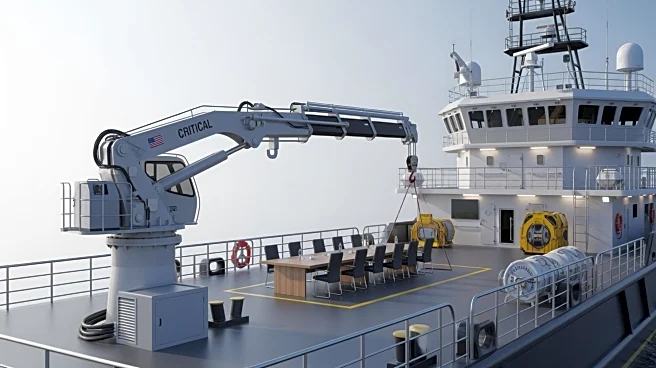What's Happening?
Dutch offshore equipment supplier SMST has been contracted by Norwegian shipbuilder Vard to provide mission equipment for two new Service Operation Vessels (SOVs) being built for North Star. These vessels
are part of a long-term charter agreement with energy company RWE. The equipment includes SMST's Telescopic Access Bridge (TAB) L2, a motion-compensated gangway designed for safe and efficient transfer of technicians working offshore, and a 5t Motion Compensated Crane for reliable cargo handling. SMST has previously supplied similar equipment for North Star's first two CSOVs, the Grampian Eagle and Grampian Kestrel, which are also set to operate for RWE.
Why It's Important?
The contract signifies continued collaboration between major industry players, enhancing operational efficiency and safety in offshore wind operations. The integration of advanced equipment supports the growing demand for renewable energy infrastructure, particularly in offshore wind projects. This development reflects the industry's commitment to innovation and sustainability, with hybrid-powered vessels contributing to reduced emissions and improved environmental performance. The partnership between SMST, Vard, and North Star underscores the importance of strategic alliances in advancing technological capabilities and meeting the needs of the renewable energy sector.
What's Next?
The successful deployment of these SOVs will likely strengthen North Star's position in the offshore wind market, potentially leading to further contracts and expansion opportunities. As the demand for renewable energy continues to rise, similar collaborations may become more common, driving technological advancements and operational efficiencies. Stakeholders, including energy companies and equipment suppliers, may explore additional partnerships to capitalize on the growing offshore wind sector. The industry could see increased investment in hybrid and electric vessel technologies, aligning with global sustainability goals.
Beyond the Headlines
The collaboration highlights the ethical commitment to reducing environmental impact through innovative solutions. The use of hybrid-powered vessels represents a cultural shift towards sustainable practices in maritime operations. Long-term, this trend may influence regulatory frameworks, encouraging the adoption of cleaner technologies across the industry. The focus on safety and efficiency in offshore operations could lead to improved standards and practices, benefiting both workers and the environment.









